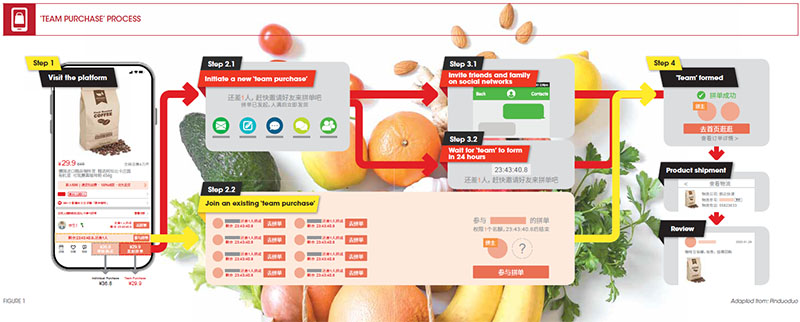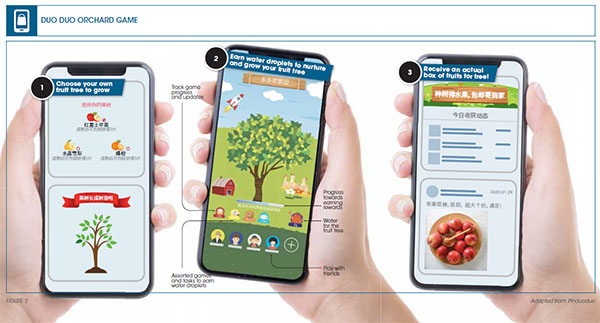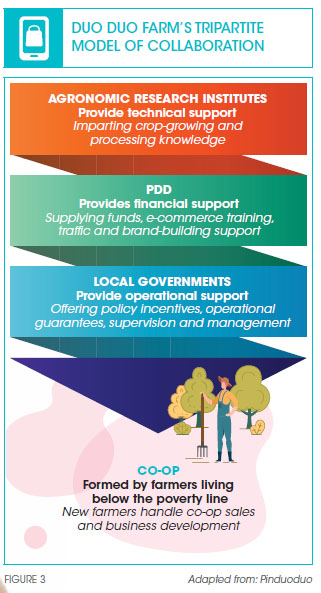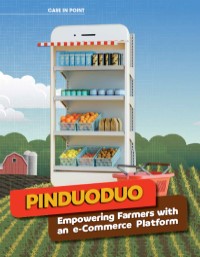A case study on how Pinduoduo's dedicated portal has helped farmers during the Covid-19 outbreak.
Pinduoduo may have just turned five years old but with a market cap of US$109 billion (as of September 1, 2020), its valuation is higher than that of oil giant Shell (US$108 billion) and HSBC (US$88 billion), one of the largest banks in the world. In fact, it is the fastest-growing e-commerce start-up in the history of China, attaining a gross merchandise value (GMV) of US$15 billion only two years after it was launched, a milestone that took incumbents Alibaba and JD.com 10 and five years to achieve respectively.
Established in Shanghai in September 2015 by serial entrepreneur Colin Huang,1 Pinduoduo was the result of Huang2 drawing upon his experiences from the e-commerce and gaming start-ups he had established previously.3 Its tagline, “Together, More Savings, More Fun”, encapsulates the essence of its brand name. Explaining his vision for the company before its debut on the U.S. stock exchange Nasdaq two years ago, Huang said he saw Pinduoduo turning into a Costco and Disneyland all rolled into one, such that it offered bargain products together with entertainment offerings. Today, over 600 million users in China would agree that he has succeeded, as they access the Pinduoduo app daily to snap up deals, share products with friends, and play games.
Huang’s experience as one of the earliest team members of Google China and his strong entrepreneurial credentials soon attracted investors. In two successive rounds of Series A and B funding, Pinduoduo secured more than US$100 million in 2016.4 Among its investors was Tencent, the owner of WeChat, the largest messaging network in China.
Since its early days, the young tech giant had been adept at manoeuvring its way in the e-commerce space. Pinduoduo made a swift pivot from direct sales to a marketplace model and continued to innovate by integrating games into otherwise quotidian online shopping. Along the way, it made a meaningful impact on rural revitalisation efforts by enabling millions of farmers to tap into a wider consumer base via e-commerce. By bypassing unnecessary intermediaries, farmers could offer fresh produce to consumers directly and a better price could be secured for both parties. Through its Duo Duo Farm initiative, Pinduoduo also aimed to raise farmers’ incomes in poverty-stricken counties by providing them with both agronomic knowledge and e-commerce know-how.
As of mid-2020, while the world continued to fight against the Covid-19 pandemic and uncertainty was plaguing decision- makers, one thing was for sure—the survival of any business would hinge on its ability to adapt to the new normal. In such a climate, how did Pinduoduo continue to evolve its business in the pursuit of sustainable agriculture solutions that improve the welfare of impoverished farmers?
The business model
‘TEAM PURCHASE’
Unlike the typical group-buying mechanism where consumers are motivated to make more referrals to reach the tipping point, Pinduoduo offered a much simpler way for customers to enjoy discounts. The company introduced the ‘team purchase’ concept, whereby the consumer chooses between a single buyer price and a ‘team purchase’ price (refer to Figure 1). If buying alone, an individual would have to pay the product’s regular price, but if consumers bought items as a ‘team’, the price would be substantially reduced—in some cases, up to half.

It was a ‘pricing on purpose’ approach, where the price difference clearly indicated the value proposition offered by the company, as the choice between the two options was designed to be instinctively obvious to anyone.
As Pinduoduo’s user base rapidly expanded, most merchants only required two people to form a ‘team’ for group buying. One could invite a friend or simply join thousands of existing ‘teams’. Adding to the virality of the platform was the ‘price chop’ feature on its app, which allowed buyers to potentially get a product for free if they could rally enough friends to click on the product link to help reduce the price to zero within 24 hours.
VIRAL SOCIAL SHARING
Word-of-mouth referrals made through WeChat, the ubiquitous mobile messaging app with one billion daily active users in 2018,5 also helped channel much of the user traffic to Pinduoduo. For instance, millions of users accessed the Pinduoduo app through a mini program embedded in WeChat and QQ6, making it the most popular mini program in WeChat in May 2020.7 Thus, Pinduoduo’s strategic partnership with WeChat and its push for organic user-sharing were key growth strategies that had contributed to its rapid user acquisition in the early years of its launch.
In addition, the app’s irresistible deals, such as the RMB 9.90 (US$1.45) special buys and flash sales, were particularly attractive to bargain hunters. Homemakers who made decisions on high-frequency purchases of low-value necessities, such as grocery and household items, flocked to the app in its early days. As the platform grew, its user base expanded. Eighty percent of its users were aged 18 to 35. Many of these buyers lived in tier three or lower cities and they became loyal customers of Pinduoduo, forming the majority of its customer base in 2019. This segment had been traditionally underserved, and it was not until the past decade that the development of logistics infrastructure and the penetration of smartphones had gathered speed in rural China.
Within the app, product virality was boosted through a ‘virtual bazaar’ on its landing homepage where users could browse through a gallery of recommended merchandise. The gallery amplified the exposure of these items, thus increasing their chances to go viral.8 Unlike other e-commerce websites that were search-centric, Pinduoduo achieved platform differentiation through stock keeping unit (SKU)-centric personalised recommendations that encouraged user browsing, and it leveraged this feature to aggregate consumption demand for a narrower range of products, turning what might have been an initial disadvantage for a fledgling e-commerce platform into a strength.
GAMIFICATION
Launched in 2018, Duo Duo Orchard aimed to provide a gamified shopping experience through an addictive mini game (refer to Figure 2). It is essentially a digital loyalty card whereby Pinduoduo rewards the buyer with virtual water droplets that are used to water a virtual tree. When the virtual tree bears fruit, Pinduoduo sends the customer a box of real fruit, which is the loyalty payoff.

Duo Duo Orchard was an instant hit with Pinduoduo users upon its launch. As many as two million virtual trees were planted after the first month, and as of end-2019, over 60 million users actively logged on to the app daily to nurture the ‘fruit tree’ of their choice. 9 To accelerate its growth, users showered the ‘trees’ with ‘water droplets’ and ‘fertilizer’ using special ‘watering cans’—all of which could be obtained by simple acts of logging in regularly, sharing products, buying items, playing other mini games and so on. To augment the fun factor, the game allowed players to visit their friends’ ‘orchard’ to ‘steal water droplets’ from unattended ‘trees’.
Using gamification to promote frequent usage and purchases on Pinduoduo’s platform proved to be a successful engagement strategy. The number of average monthly users increased more than twofold from 195 million in 2018 to 487 million in 2020.
Beyond a platform business to enhancing rural e-commerce
EMPOWERING FARMERS THROUGH DUO DUO FARM
In April 2019, Pinduoduo launched the Duo Duo Farm programme with the goal of alleviating rural poverty through an integrated approach that helps farmers from planting to selling their harvest. Through the delivery of entrepreneurship training, coupled with the allocation of marketing resources worth RMB 15.9 billion (US$2.2 billion) and cash subsidies amounting to RMB 2.9 billion (US$413 million) in 2019, Pinduoduo transformed the farmers into farming entrepreneurs, 10 and helped raise incomes of the farming community. It plans to support one million rural online stores over a five-year period (2020-2025).
Duo Duo Farm operates on a tripartite partnership model involving Pinduoduo, local provincial governments, and agronomic research institutes (refer to Figure 3).

To support the farmers’ upskilling efforts, Duo Duo University, Pinduoduo’s training arm, equipped entrepreneurial farmers with e-commerce operations know-how, as well as marketing knowledge and tools to promote farm products to urban consumers. In 2019, on top of its regular online course offerings, Duo Duo University conducted over 1,400 hours of offline courses for over 490,000 farmers across 12 provinces in China.
Pinduoduo also helped farmers optimise their planting decisions by providing advice generated from its artificial intelligence (AI) capabilities. Leveraging on its distributed AI algorithm, it could effectively predict the demand for various types of fruit, and make recommendations to farmers ahead of their planting and harvesting schedule. Farmers could then maximise their earnings by meeting the expected level of consumer consumption.
As rural areas in China became more urbanised, the younger generation that had earlier left their villages to work in larger urban cities were attracted by the increasing number of job opportunities back in their hometowns. Upon their return, they were readily employed in areas such as farming business development, web store operations, and logistics, as they tended to be more tech-savvy and proficient in e-commerce. By spearheading the homecoming of the younger generation and providing them with employment opportunities in the local farming business, Pinduoduo played a considerable role in revitalising the local agricultural industry.
LIFTING FARMERS OUT OF POVERTY
The Duo Duo Farm programme was also aligned with the country’s campaign to eradicate poverty and revitalise rural areas by end-2020. It was introduced in the southwestern and northwestern parts of China, which were designated by the Chinese government as areas of extreme poverty. These included Nujiang, where mandarin oranges grew in high-altitude valleys; Baoshan, where high-quality coffee beans were harvested; as well as Wenshan, where yacons (a South American root vegetable) lined the fields. For the first time, orange growers in Nujiang experienced the efficiency of the drip irrigation system, while Baoshan and Wenshan planters could produce higher quality coffee beans and yacons respectively.
The seasonal fruit given free to Duo Duo Orchard players for achieving a certain target are sourced from these impoverished regions. Farmers from these regions sold more than 500,000 kilogrammes of fruit to Pinduoduo, which were delivered to Duo Duo Orchard players on a daily basis as of 2019. Collectively, these impoverished farmers benefited from increased incomes as a result of improved productivity, higher prices charged for better quality products, and recurring sales.
As of 2019, Pinduoduo had onboarded over 150,000 poor merchants and was on its way towards extending its reach to another seven provinces, to set up 1,000 Duo Duo Farms by 2024. The produce sold by these farmers on Pinduoduo’s platform fetched RMB 4.8 billion (US$684 million) in 2019, an increase of 413 percent over the previous year.
Agile response to the Covid-19 crisis
PROMOTING AGRICULTURAL PRODUCE VIA LIVESTREAMING
The Covid-19 pandemic had shaken the world and brought many economic activities to a standstill. When China was locked down in January 2020, fresh produce at the farms piled up as it could not be transported out of the villages to urban markets. On the demand side, consumers were stocking up on fruits and vegetables as they cooked more frequently while being confined at home. Pinduoduo attempted to quickly bridge the demand-supply gap by setting up a dedicated portal to help farmers affected by the lockdown showcase their agricultural produce via livestreaming.
Farmers were thus encouraged to promote their agricultural produce directly to consumers through live video broadcasting, a promising new sales channel that had taken off in China in the late 2010s. Livestreaming on video-sharing apps such as Douyin, the Chinese version of TikTok11, skyrocketed as more growers in China turned to social media to sell online. Farmers were first coached on the basics of video production, which turned out to be particularly useful for the first-timers. Launched on February 10, 2020, the portal hosted 35,000 livestreaming channels, received an overwhelming 27.5 million orders, and sold over 120,000 tonnes of produce over the first five weeks.
Pinduoduo further collaborated with the government of Hubei province, the hardest-hit area, to extend the initiative to 500 farmers two months later. As of May 2020, the nationwide programme had reached out to 180,000 farmers from nearly 400 agricultural regions, including 230 poverty-stricken counties that needed help most.
SUPPORTING THE SPRING PLANTING SEASON
Other than offloading the surplus of harvested produce, farmers had to contend with the disruption of the spring planting season, which takes place from March to May each year. Faced with shortage in cash flow to purchase seeds, fertilizer, and planting equipment for growing crops, farmers turned to Pinduoduo’s subsidised sales of these items during the Spring Planting Festival in March 2020. Through its partnerships with major agricultural brands, the company subsidised 15,000 SKUs of purchases made by farmers to help them reduce their production costs. The estimated potential savings for the farming community came up to a total of RMB 300 million (US$42 million).
In conjunction with the Festival, millions of farmers benefited from attending online training classes conducted by agronomists from the China Agricultural University, and the National Engineering Research Center for Information Technology in Agriculture. The classes were a part of a New Farmer Lecture Series that taught farmers about smart agricultural services and equipment, pest control, and so on. Encouraging farmers to adopt modernised farming techniques went a long way towards increasing their efficiency and reducing the need for manual labour, thereby boosting profitability ultimately.
Charting its path in the post-Covid-19 era
At a World Bank webinar held in May 2020, Pinduoduo had shared three observations with the audience. 12 First, a change in shoppers’ behaviour was apparent as more people turned to buying online to avoid making trips to crowded grocery stores. The company said that agricultural produce was one of the items most frequently bought online.
Second, the element of trust, particularly its role in influencing buying behaviour, had become more important during the pandemic. Pinduoduo observed that many buyers took their cue from their more conscientious and discerning family members and friends, and tended to buy products that the latter had chosen, as they trusted the latter’s choices.
Third, price hikes had started surfacing as some popular merchandise like personal protective equipment went out of stock. Besides the introduction of monitoring features, Pinduoduo revealed that it had subsidised the affected products so that they were still affordable to buyers. People were also becoming more anxious over the possibility of food shortages due to lockdowns enforced in response to the pandemic. Pinduoduo reported that it had been working with the Chinese government and logistics providers in the country to ensure that agricultural produce could still be transported despite any lockdown being imposed, thus giving consumers confidence that their food supply would not be disrupted when they made purchases using the Pinduoduo platform.
It is no wonder that Huang has expressed confidence that innovative business models such as Pinduoduo’s would triumph in a post-Covid-19 world. In a letter to investors dated April 25, 2020, he wrote: “The impact of this sweeping force will fundamentally and permanently change the world we are in now…new models are bound to emerge and grow in a whole new set-up. We (see) the phasing out of some as new ones emerge.”13
During these turbulent and uncertain times, trust and security had become the currency of consumer experience for Pinduoduo. Nevertheless, a burning question remains. How can Pinduoduo successfully strike a balance between its efforts to revitalise China’s agricultural sector and enable impoverished farmers to exit poverty and its pursuit of e-commerce as its core business?
Dr Hao Liang
is Associate Professor of Finance and DBS Sustainability Fellow at Singapore Management University
Dr Cheah Sin Mei
is Senior Case Writer at the Centre for Management Practice, Singapore Management University
References
1. Colin Huang is also known as Huang Zheng.
2. As of July 1, 2020, Colin Huang had stepped down as the CEO of Pinduoduo, but remains its Chairman.
3. Huang’s entrepreneurial ventures included a consumer electronics website named Ouku, a marketing services company named Leqee, and a gaming studio named Xunmeng.
4. Emma Lee, “The Incredible Rise of Pinduoduo, China’s Newest Force in E-Commerce”, Tech Crunch, July 27, 2018.
5. Cyrus Lee, “Daily Active Users for WeChat Exceeds 1 Billion”, ZD Net, January 9, 2019.
6. QQ is an instant messaging mobile app widely used in China.
7. Aldzs, “Ranking of Mini Programs”, May 2020.
8. Merchandise that went viral were usually sold online, highly popular, trendy, or considered a good catch for consumers.
9. 36KR, “Pinduoduo Announces Agriculture Report”, April 21, 2020.
10. Farming entrepreneurs are new-generation farmers who are knowledgeable about modern farming techniques and have management capabilities to run agriculture- related businesses.
11. TikTok is a Chinese video-sharing social network service.
12. The World Bank, “Pinduoduo, A Digital e-Commerce Platform in China: Connecting Millions of Farmers to Markets in Times of Covid-19”, May 6, 2020.
13. Colin Zheng Huang, “2020 Letter to Shareholders”, Pinduoduo, April 25, 2020.
